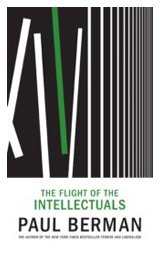The Flight of the Intellectuals | By Paul Berman | Melville House | 220 pages, $22.95
Paul Berman spends much of The Flight of the Intellectuals relentlessly dismantling a work of journalism—namely, Ian Buruma’s sympathetic 2007 profile of the Swiss Muslim scholar Tariq Ramadan for The New York Times Magazine. A brainy, book-length assault on a single magazine piece may sound excessive. But for Berman, the article represents a grave error in the way many journalists and thinkers are approaching one of the great tasks of our time: reconciling the Muslim and Western worlds.
 Buruma and other elite journalists have helped position Ramadan as a moderate who can bridge the gulf between fundamentalist Islam and the secular West. While noting that his subject is neither secular nor liberal, Buruma described his views as “an alternative to violence, which is … reason enough to engage with him.” Doing his journalistic duty, Buruma raised all the right concerns about Ramadan, but mostly in the context of dismissing them. As Berman puts it, the article “was not quite a ringing endorsement. Still, it was an endorsement.”
Buruma and other elite journalists have helped position Ramadan as a moderate who can bridge the gulf between fundamentalist Islam and the secular West. While noting that his subject is neither secular nor liberal, Buruma described his views as “an alternative to violence, which is … reason enough to engage with him.” Doing his journalistic duty, Buruma raised all the right concerns about Ramadan, but mostly in the context of dismissing them. As Berman puts it, the article “was not quite a ringing endorsement. Still, it was an endorsement.”
Berman goes on to explain why such an endorsement should be unthinkable. In the process, he ranges over such formidable territory as the distinction between totalitarianism and fascism and the parallels between Ralph Waldo Emerson and the eleventh-century Muslim philosopher Muhammad al-Ghazali. But he also sustains a suspenseful tone straight out of Sherlock Holmes, as if every deduction is taking us closer to the dramatic fingering of the murderer—or, given that this is an intellectual potboiler, the idiot.
His case against Ramadan is often circumstantial, but nonetheless powerful. It begins by placing the mild-mannered academic firmly within the tradition of radical Islam’s founding father, Hassan al-Banna—who happens to be Ramadan’s grandfather. There is no question that Ramadan’s prolific writings are overwhelmingly reverent of Al-Banna and other backward-looking Islamists. And Al-Banna in turn revered such figures as Haj Amin al-Husseini, the Palestinian mufti who spearheaded Nazism’s export to the Muslim world.
Berman draws a sharp distinction between this fascist-inflected Islamism and Islam at large, underscoring other writers’ failure to do so. He argues that the term Islamofascism is not just a clumsy coinage dreamed up by the Bush administration to justify its war in Iraq, but an appropriate description of the supremacist, anti-Semitic ideology to which Ramadan is linked. As Berman sees it, the liberal intellectuals and journalists who accept Ramadan as a moderate are therefore accepting the terms and conditions of Islamism—and abandoning the true Muslim liberals whose ideas are compatible with the West.
On more than one occasion, Ramadan has shown what Berman regards as his true colors. During a 2003 television debate with Nicolas Sarkozy, then France’s interior minister, Ramadan failed to muster an outright condemnation of the practice of stoning women to death for adultery. Instead, noting the importance of “consensus among Muslims,” he called for a “moratorium” to allow for a full debate about the propriety of such punishments.
Ramadan is attractive to Western journalists partly because he is moderate in manner, always seeking consensus and middle ground. But Berman encourages us to ask: A middle ground between which poles? Between stoning adulteresses and maybe not stoning them if we can come to an accord?
Berman figures Ayaan Hirsi Ali, the Somali refugee-turned-activist who has unequivocally condemned mistreatment of women in the Muslim world, as Ramadan’s foil. Hirsi Ali is infallibly immoderate in tone. For that she has earned the backhanded admiration (at best) and disdain (at worst) of Buruma and other journalists. But at least some of her principles—a woman’s right to keep her genitals intact, for example—aren’t the sort on which democratic societies can afford to compromise.
How did Western journalists come to be more respectful of decorous fundamentalists than they are of brash secularists? For one thing, they fear that Hirsi Ali’s criticisms of her own tradition will embolden anti-Muslim bigots and xenophobes in America and Europe. Berman adds another answer that’s startlingly simple: rejections of Islamism have become life-threatening. To make the point, the book concludes with a roll call of writers and thinkers under armed guard.
Flight of the Intellectuals is a reminder of the frailties of journalism, and not only in the face of death. “It is not obvious to me that Buruma, in preparing his profile for The New York Times Magazine, had read very much by Ramadan,” Berman complains. Journalists try to approximate the truth with the time and information they have. Rarely can they digest the complete works of a writer as prolific as Ramadan or, for that matter, the vast body of other sources Berman patiently draws on. Journalists choose an angle and go with it—and sometimes, as this sharply argued book suggests, they get it wrong.
Click here for a complete Page Views archive.
Josh Gohlke is the Philadelphia Inquirer’s op-ed editor.
